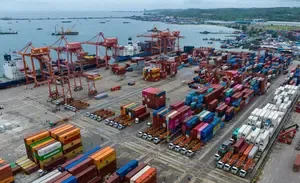Did South Korea's Exports Rise by 3.7% in April?

Synopsis
Key Takeaways
- Exports rose 3.7% in April for South Korea.
- Record high of $58.2 billion in outbound shipments.
- Exports to U.S. decreased 6.8% due to tariffs.
- Semiconductor exports hit a record of $11.7 billion.
- Trade surplus reached $4.88 billion.
Seoul, May 1 (NationPress) South Korea's exports increased by 3.7% compared to the previous year in April, marking a third consecutive month of growth. However, outbound shipments to the United States saw a notable decline due to the hefty tariffs imposed during the Donald Trump administration, according to data released on Thursday.
Last month, outbound shipments totaled US$58.2 billion, achieving the highest figure for any April, as reported by the Ministry of Trade, Industry, and Energy.
Conversely, imports fell by 2.7% year-on-year to $53.3 billion, leading to a trade surplus of $4.88 billion, as per Yonhap news agency.
Notably, exports to the U.S. decreased by 6.8% year-on-year to $10.6 billion, which resulted in a $900 million drop in Seoul's trade surplus with the U.S. compared to last year.
This sharp decline in shipments to the U.S. is primarily linked to a fall in exports of automobiles, semiconductors, and machinery, as stated by the ministry.
Specifically, automotive exports to the U.S. plummeted 16.6% to $2.51 billion, while semiconductor exports decreased by 31% to $400 million. Additionally, machinery product shipments reduced by 22.6% to $970 million.
On a positive note, exports of petroleum products, rechargeable batteries, and wireless communications equipment to the U.S. saw an uptick.
"The significant U.S. tariffs seem to have influenced South Korea's exports to the U.S., although the impact varies across sectors," stated Park Jung-sung, Deputy Minister for Trade and Investment.
He further elaborated that the automotive sector faced challenges not only from tariffs but also from fluctuating demand for electric vehicles (EVs).
Interestingly, exports of auto parts to the U.S. increased last month, as companies sought to stock up ahead of the impending U.S. tariffs on auto parts starting Saturday (U.S. time).
Meanwhile, exports to China rose by 3.9% year-on-year to $10.9 billion, driven by robust demand for smartphones and semiconductors. Similarly, exports to the Association of Southeast Asian Nations (ASEAN) climbed 4.5% to $9.4 billion, bolstered by the semiconductor and steel industries.
Moreover, outbound shipments to the European Union surged by 18.4% to a new monthly record of $6.7 billion, while shipments to India increased by 8.8% to $1.7 billion.
By product category, semiconductor exports skyrocketed by 17.2% to reach $11.7 billion, marking the highest figure for any April, driven by a rise in the price of 8-gigabit DDR4 DRAM and a growing demand for high-value products like high-bandwidth memory (HBM).
Furthermore, exports of wireless communications equipment, including smartphones, expanded by 26.5% to $1.5 billion, marking the third consecutive month of growth.
Outbound shipments of biohealth products surged by 14.6% to $1.4 billion, also the highest for any April, while steel shipments grew by 5.4% to $3 billion.
However, exports of automobiles, a vital export item for South Korea, declined by 3.8% year-on-year to $6.5 billion, due to lower demand for internal combustion engine vehicles and electric vehicles (EVs).










